It has been two years since I was last in Prague.
She’s like a friend, who’d invited
me back.
A conference on Play and Democracy called.
I was happy to
come, even as history was whirling in the USA.
Not sure where its taking us.
Prague reminds us of how to ride the tides.
On the plane I read about the protest
we’d be attending the next day; thirty years after the revolution people were
still out in the streets demanding democracy work for the people, not just the
powerful.
And thought about my friends in the
Extinction Rebellion, who’d been organizing another action in New York the day
I arrived in Prague.
I always read Unbearable Lightness
of Being when I come to Prague.
Kundera’s novel is one of my
favorites.
With Thomas and Theresa struggling
with the aftershocks of the crackdown on Prague Spring, their relationship felt
more tenuous than ever. Would communism
have worked in Prague if they’d democratized communist rule? Could they have?
None of us will know.
Tanks rolled in.
Theresa took photos.
Thomas wrote and worked.
First as a doctor, then as a winder
cleaner after he wrote too much.
Hearts broken.
Jan set himself on fire.
Despair grasped him.
Grasped them.
Thomas was stuck.
Theresa was lost.
Kundera explains:
“Human life occurs only once, and the reason we
cannot determine which of our decisions are good and which bad is that in a
given situation we can make only one decision; we are not granted a second,
third, or fourth life in which to compare various decisions.”
I read about them over and over.
Walking through Praha, Will and I
talked about that history.
“What?”
“They get thrown from buildings
here,” he explained over a beer at Club Ujezd,
or Újezd 18, a quirky spot I know in Mala
Strana, its “lesser quarter.”
“Its my favorite place in Prague,” I
gushed, looking at the surreal decorum,
the sculptures, a worm coming out the ceiling, sipping on the absinthe, reminding us this is the town
of metamorphoses.
“When Gregor Samsa woke up one morning from
unsettling dreams, he found himself changed in his bed into a monstrous vermin,”
Kafka wrote here.
What if we awoke and our whole world was
transformed?
Will’s got other things on his mind:
“I can’t stop thinking about the
defenestration.”
“Huh?”
“People getting thrown out the windows.
There were two of them.
On the second, the representatives for the Holy Roman empire were thrown out of a
window in the castle when they informed
the King of Bohemia that they no longer
had religious freedom in 1618.”
“What happened?”
“It marked the Bohemian revolt
against Habsburg Rule and started the thirty years war. Lets go see the winder where it happened tomorrow,” he insisted, over another beer. “Lets
also go to the Tiger, the pub
Havel took Clinton to when he wanted
to go to a traditional Prague beer hall.
“Hey twin brothers! Do you want to
go to the Clan Club with us?” asked a woman sitting to the right.
Will was concentrating on history.
And we made our way back to Il Stare
Pani, our hotel on the other side of the river.
“He’s the rabbi who told the story of the Golem,” noted a woman to our
left making our way through the Jewish Cemetery the next morning, pointing to
the grave stone of Rabbi Löw, who according to legend, he “went to the banks of
the Moldau one night for his own form of experimentation: he gathered some wet
clay, applied esoteric knowledge drawn from cabalistic texts and breathed life
into the amorphous mass, creating the Golem.”
“You feel that gloom here,” I commented
looking at the graves. “’Kafka wrote about
the anti Semitism here, the sickness.
“They built something like twelve layers
of graves here, one on top of the other,” Will commented, referring
to the graves piled on top of each other from 1439 to 1787 found here.
Up up we walked to the Castle we
wandered looking for the window.
Everywhere we looked, entrances up
to the room where the King killed the messengers were blocked.
And we made
our way down to the Bridge,
Drinking a beer looking at the
statues, talking about his first trip here in 1995 and the girl he came with.
“You don’t shoot the messenger,”
Will explained. “That’s what they
did. They shot the messenger.”
He looked up.
‘There’s the window where they were killed, right there. “
“I can’t believe we didn’t see it.
Come on we’ve got a protest
to go to.”
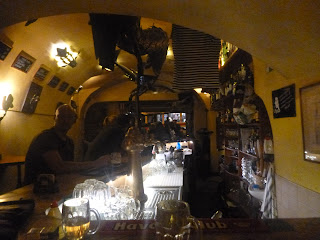





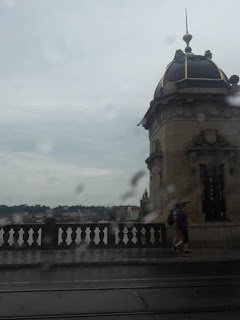






















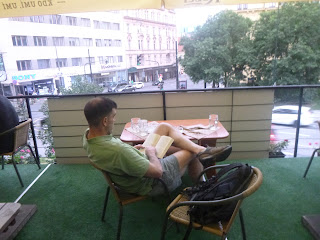




































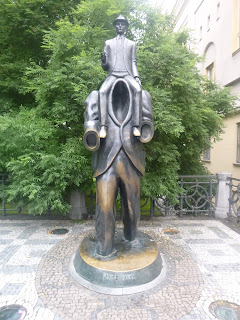






















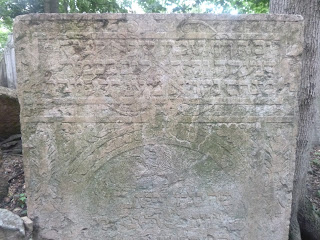











































































No comments:
Post a Comment